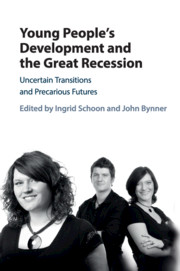Book contents
- Frontmatter
- Contents
- List of Figures
- List of Tables
- Contributors
- Acknowledgments
- Preface
- List of Abbreviations
- Part I Introduction
- Part II The Changing Context of Youth Transitions
- 2 Globalization and Its Impact on the Political, Economic, and Labor Market Aspects of the Transition
- 3 The Great Recession and Youth Labor Market Outcomes in International Perspective
- 4 Comparative Perspectives: Education and Training System Effects on Youth Transitions and Opportunities
- Part III Variations in Education and Employment Transitions during Times of Economic Hardship
- Part IV The Impact of the Great Recession on Families
- Part V Future Orientations and Well-being
- Part VI Conclusion
- Index
- References
3 - The Great Recession and Youth Labor Market Outcomes in International Perspective
from Part II - The Changing Context of Youth Transitions
Published online by Cambridge University Press: 20 October 2017
- Frontmatter
- Contents
- List of Figures
- List of Tables
- Contributors
- Acknowledgments
- Preface
- List of Abbreviations
- Part I Introduction
- Part II The Changing Context of Youth Transitions
- 2 Globalization and Its Impact on the Political, Economic, and Labor Market Aspects of the Transition
- 3 The Great Recession and Youth Labor Market Outcomes in International Perspective
- 4 Comparative Perspectives: Education and Training System Effects on Youth Transitions and Opportunities
- Part III Variations in Education and Employment Transitions during Times of Economic Hardship
- Part IV The Impact of the Great Recession on Families
- Part V Future Orientations and Well-being
- Part VI Conclusion
- Index
- References
Summary
Abstract
In this chapter, we consider the impacts of economic recession on youth employment and educational outcomes around the world. We seek to understand how national differences in institutional structures and culture shape youth responses to deteriorating economic circumstances. The work is divided into four sections. The first section describes how deteriorating economic circumstances affect youth: directly, through increases in youth unemployment and underemployment; and indirectly, through family economic stress and diminishing public services. The second examines how the social context affects youth responses to economic shocks, taking into account institutional and structural factors and cultural frames that enhance or circumscribe youth options. We show that strong bridges between the school system and the labor market can cushion the negative effects of the recession on employment prospects. The third section examines how economic downturns affect both the demand and the supply sides of the higher education system: increasing enrollments, elevating costs, and increasing the diversity of the student body and its distribution across institutions. The final section identifies fruitful questions for further comparative cross-national research on the effects of economic recession on youth transitions from school to work and youth's future labor market prospects.
Introduction
Before the onset of the Great Recession in 2008, youth labor market prospects were improving around the world. In the OECD (Organisation for Economic Co-operation and Development) area, for example, youth unemployment fell from 16 percent to 14.4 percent between 1997 and 2007 (Scarpetta, Sonnet, and Manfredi 2010). In developing countries, industrial production and labor markets were performing impressively well (Didier, Hevia, and Schmukler 2011) and youth unemployment rates had reached their lowest level in decades. But the Great Recession broke this trend, imposing greater difficulties in both entering and remaining in the labor market. By 2009, youth unemployment had reached 18.8 percent, on average, in the OECD area, adding 4 million young people to the ranks of the unemployed. In countries like Ireland, France, and Hungary, youth unemployment went up beyond 25 percent, and in Spain it reached the staggering rate of 44 percent.
- Type
- Chapter
- Information
- Young People's Development and the Great RecessionUncertain Transitions and Precarious Futures, pp. 52 - 74Publisher: Cambridge University PressPrint publication year: 2017
References
- 5
- Cited by



